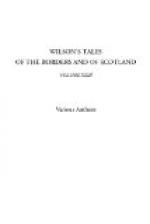At midnight, two days after, Kalee slept in Logie kirkyard. There is no stone to point out the grave of the Indian princess, who lies—as becomes, too, in our boasted land of liberty, entitled to her boast in an equality at length, which even pride cannot deny—among the humble artisans and cottars of Lochee. Did Fletcher Read, on that after day, when Panmure blew the white iron trump, not expect to see Kalee rise up and seek judgment on the house of Logie? The blood was hereditary, and the heart that is fed by the blood, and which impels it.
If it had not been that Aminadab married the portly Janet, we might have heard no more of the fortunes of this man. But how true Aminadab’s quotation, that God’s vengeance never sleeps! Where, in all the scathed corpses of heaven’s lightning, was there ever one that told its tale like that of Fletcher of Balinsloe, Lindertes, and Logie? He was recalled to India again.
“Ay, Aminadab, he was forced to go by the Government; but maybe the Government was only like a thing that is moved by the storm, and cuts in twain, where its own silly power could do nothing. Before he went, he married a beautiful little woman,[*] perhaps the most spirited in the shire, white as Kalee was black, and come, too, of gentle blood. Why did she marry this man? Had she not heard of the fate of Kalee? Had she not seen the Cradle (still standing in the hollow of the hill)? No doubt; but woman will go through worse storms than man’s passion to get to the goal of wealth and honour. Then there is a frenzy in woman, Aminadab. She is like the boys, who seek danger for its own sake, and will skim on skates the rim of the black pool that descends from the film of ice down to the bubbling well of death below. Women have an ambition to tame wild men; ay, even wild men have a charm for them, which the tame sons of prudence and industry cannot inspire. So it was: they were married, and he took her to India.”




